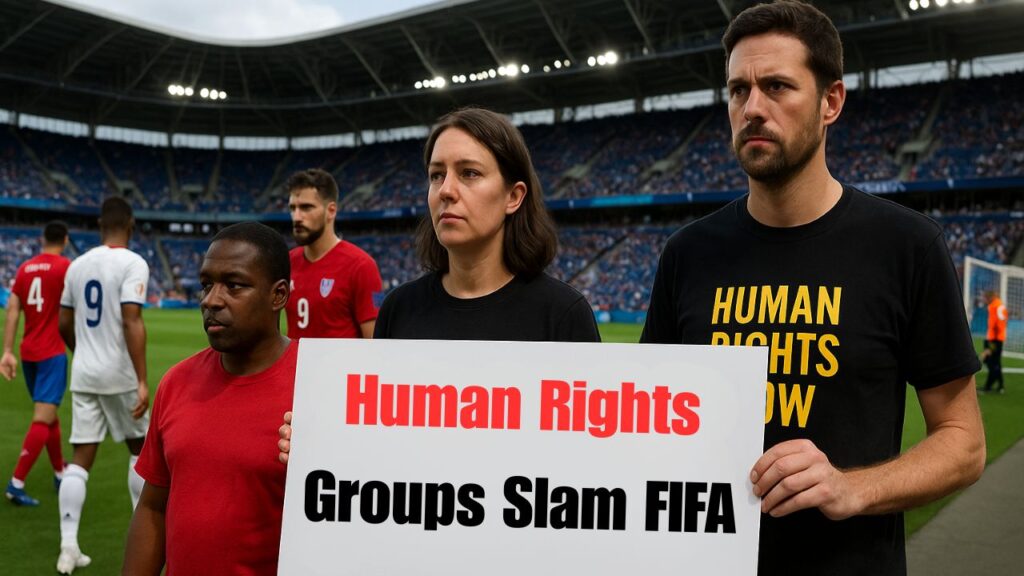The upcoming FIFA World Cup 2026 is already stirring global debate as several human rights groups criticize FIFA for what they call a lack of proper planning and ethical oversight. Organizations such as Human Rights Watch and Amnesty International have warned that the event could be a “disaster” for both workers and fans if urgent changes are not made. Concerns include unsafe labor practices, poor housing for migrant workers, and unclear fan safety policies across host cities in the United States, Canada, and Mexico. These warnings have raised serious questions about FIFA’s commitment to human rights and fair treatment in one of the world’s biggest sporting events.

Human Rights Groups Raise Alarming Concerns
Leading watchdogs like Amnesty International have accused FIFA of failing to learn from the Qatar World Cup controversies. According to their statements, construction workers are being subjected to long hours, low wages, and minimal safety protections in several host cities. The FIFA organizing committee has responded by promising tighter labor audits and welfare checks, but activists argue that without independent monitoring, these promises mean little. The concern isn’t limited to workers alone—fans may also face inflated accommodation costs, restricted travel access, and logistical chaos if issues are not resolved before 2026. Experts warn that if FIFA ignores these red flags, it risks severe reputational damage.
Challenges in Coordinating Across Three Nations
The 2026 World Cup will be unique as it spans three countries—the USA, Canada, and Mexico. While this brings diversity and scale, it also introduces complex logistical challenges. Human rights advocates say that cross-border differences in labor laws, visa regulations, and stadium construction standards could leave gaps in worker protection. In the U.S., local unions have reported inadequate housing for temporary laborers, while in Mexico, several construction projects allegedly face delayed payments. The coordination between governments, local contractors, and FIFA must improve rapidly to prevent what many fear could become the most chaotic World Cup in modern history.
FIFA’s Response and Damage Control Plans
FIFA has defended its preparation by highlighting a new Human Rights Advisory Board and regional partnerships aimed at monitoring ethical practices. However, critics claim these measures are mostly symbolic and lack enforcement power. Human Rights Watch has demanded transparent reporting and the inclusion of independent investigators on all stadium and infrastructure projects. The organization also urged FIFA to publish its worker compensation records and outline how it plans to protect fan rights. With global attention fixed on FIFA’s next moves, the governing body’s credibility is at stake, especially after years of scrutiny following corruption allegations and past labor abuses.
Global Reactions and What Lies Ahead
The backlash has triggered international discussions, with governments in North America under pressure to ensure fair treatment of all involved in the World Cup 2026. Fan groups are demanding clarity on ticket pricing, accommodation security, and travel policies across host cities. Meanwhile, advocacy groups continue to monitor labor practices and threaten protests if conditions don’t improve. Despite the criticism, FIFA maintains that the event will “set new standards” for inclusivity and safety. Whether it lives up to that promise remains uncertain, but for now, both workers and fans are watching closely as the countdown to kickoff begins.
| Country | Key Concerns | Human Rights Group Involved |
|---|---|---|
| United States | Worker safety, fair wages, fan accommodation | Amnesty International |
| Canada | Construction oversight, housing for workers | Human Rights Watch |
| Mexico | Delayed payments, unsafe work conditions | Global Labor Federation |
 FIFA Confirms Semi-Finals and Final Venues for 2026 World Cup — Here’s the Complete Knockout Layout
FIFA Confirms Semi-Finals and Final Venues for 2026 World Cup — Here’s the Complete Knockout Layout
FAQ 1: Why are human rights groups criticizing FIFA?
They believe FIFA has not implemented strong enough protections for workers and fans during World Cup preparations.
FAQ 2: Which countries are hosting the 2026 World Cup?
The tournament will be co-hosted by the United States, Canada, and Mexico.
FAQ 3: What are the main worker concerns?
Activists cite long hours, low pay, and unsafe construction conditions at several venues.
FAQ 4: Has FIFA responded to these accusations?
Yes, FIFA announced a Human Rights Advisory Board, but critics argue it lacks real enforcement power.




